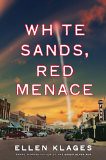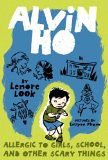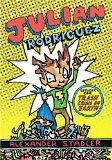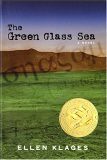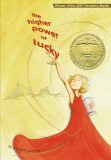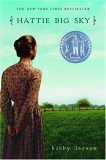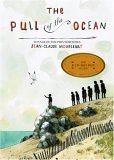Well, all of my work has been turned in and all of my classes have been attended. Assuming I didn't totally fail that last paper, I will graduate from my MLIS program next Sunday.
And, now that I am no longer writing 2 research papers on rather depressing topics (intellectual freedom for students in American public schools and the inherent power plays involved in where a nation/culture's archives are physically located) I can get back to babbling about books.
And maybe catch up on my blog reading. That 1000+ unread posts on my Google Reader is a more than a little daunting! And I'll whittle it down to a cool 500-something unread and then, next thing I know, I'm back up to 1000+ le sigh
Anyway, books. Today's reviews have nothing to do with each other, but just a random hodge-podge of what I've read lately. (Really, I have a bag of books that need reviewing and I'm just reaching in and pulling them out.)
White Sands, Red Menace Ellen Klages
Did you love The Green Glass Sea? I know I did, and this sequel did not disappoint. Dewey is living with Suze and her parents in a small town in New Mexico in that oft-forgotten time after WWII, but before the 1950. The scientific community that worked at Los Alamos is still trying to come to grips with what it has done, TV may be the next big thing, and their town is divided between White and Hispanic. Plus, the legality of Dewey staying with the Kerrigans is totally up in the air.
I liked the struggles of Dewey and Suze's friendship--how well they knew each other, and how sometimes that didn't matter. I also liked how they were able to branch out and make friends and have projects independent of each other--I was worried how they would survive once they left the very insular community of Los Alamos. Like she did in Green Glass Sea, Klages really captures the chaotic time well, while still never giving her characters more knowledge than they should have, or letting it overpower the story.
An excellent book about a period in time we tend to completely skip right over.
Alvin Ho: Allergic to Girls, School, and Other Scary Things Lenore Look
From the same author who writes the fantastic Ruby Lu books comes a new character.
Alvin longs to be a gentleman, but it's hard when he's too afraid of school to actually talk and when his only friend at school is a girl (ew). Plus, there are a lot of rules to remember. It's hard. But short, episodic chapters make this an excellent (and hysterical) book just right for those who have just finished withthe transitional, my-first-chapter type books.
My favorite part was when he finally talked to his therapist, but only in Shakespearean insults.
I'm looking forward to June, which brings us Alvin Ho: Allergic to Camping, Hiking, and Other Natural Disasters!
Julian Rodriguez: Trash Crisis on Earth
Ok, the whole plot of this book is that Julian doesn't want to take the trash out and is sent to his room until he does.
But the premise is that Julian is an alien (or thinks he is) and is communicating with the very sympathetic mother ship about how horribly unfair his life on earth is. Something I think many kids, even if they aren't aliens, will relate to. Lots of pictures, some comic book type format, and computer interaction makes this a fun one for the one-step up from beginning readers.
Showing posts with label Ellen Klages. Show all posts
Showing posts with label Ellen Klages. Show all posts
Saturday, December 13, 2008
Wednesday, April 18, 2007
More Winners and the like
Now Reading: Un Lun Dun
Just Finished: The Invention of Hugo Cabret, Diary of a Wimpy Kid, Persepolis: The Story of a Childhood, Special Topics in Calamity Physics, The Brothers Grimm: Two Lives, One Legacy, The Talented Clementine,Persepolis 2: The Story of a Return
The Green Glass Sea by Ellen Klages was this year's winner for the Scott O'Dell prize for historical fiction.
Dewey is a weird kid-- there's something wrong with her leg that makes her limp and she spends all of her time making gadgets and fiddling with stuff. Her dad is working on some top secret project that is going to help win the war and when her grandmother dies, she goes off to live with him.
Dewey didn't realize how top secret this project was. She didn't realize she was moving to a place that didn't officially exist... All she knew was everyone was living out in the desert working on the gadget. The gadget would win the war. The gadget would make everything better.
Suze has been living at Los Alamos for awhile when Dewey moves there-- Suze is a bit awkward and bossy and both of her parents are working on the project-- her mom's a real scientist, not just a typist or secretary like the other moms. When Dewey's dad has to go to Washington for awhile, Dewey moves in and the pair form an unlikely, but entirely realistic, friendship.
What's great about this book is the portrait of day-to-day life at Los Alamos-- you never think about kids living with their families, going to school, and being kids. You never think about the divisions between scientist kids and military kids. And you never think about Los Alamos just plain not existing... (well, at least I never thought about those things.)
This balances the line perfectly of being meticulously researched and historically wonderful, while not letting this detail overshadow the actual story. I liked how realistic the interactions between the kids were-- this unlikely friendship took a long time to develop and it never came across as hokey or simplisitic.
My favorite part of the book was how delicately it dealt with some very large issues that need to be tackled when dealing this topic-- it put them in there so you knew people were worrying about them, but Dewey hears about them and deals with them in a way that is very true to her age. In Surely You're Joking, Mr. Feynman! (Adventures of a Curious Character) Feynman (a minor character in this book, much to my delight) talks about the horror of what they had done after the first test. The book captures this horror well with the adults and the confusion of the kids at what's going on.
Something happens about 3/4 of the way through the book that is a bit of a spoiler so I'm not going to talk about it too much, but it was just too much and I don't really think it was necessary (but it might be for the sequel that I am very much looking forward to!)
The other thing is... I'm assuming that if you're reading my blog, you know what the gadget was-- you know what was invented at Los Alamos during WWII to win the war. Dewey and Suze, and therefore the reader, never find out was the gadget was, and I'm not sure how much sense the ending of the book is going to make if you don't know. I also don't know if the intended audience is going to automatically know what the gadget was...
Still, an excellent book and a well-deserving win.
Once upon a time, a very long time ago, I promised I'd review this years Newberry winner, The Higher Power of Luckyby Susan Patron.
I wanted to wait down until all the fervor over SCROTUM faded away. And then it came back. And then it faded again.
Anyway... Lucky really surprised me. I hadn't heard anything about it before Newberry day and in reading the description-- it didn't sound kid-friendly. It sounded like it was going to be really nostalgic and an adult book written for kids.
It wasn't! I was so happy!
Lucky lives with her French guardian (he absent father's ex-wife) in the middle of the desert. She likes to eavesdrop on 12 step meetings to find out how people find their higher power-- higher power sounds like a handy thing to have, but Lucky's hoping to avoid hitting rock bottom in order to get it. Hitting rock bottom doesn't sound like much fun.
At the same time, Lucky's worried her guardian is going to go back to France-- she seems homesick and her passport was out the other day.
Deep down, this is a really sweet tale that will appeal to younger readers, but also has some really big issues for older readers to get into.
Most enjoyable was the large cast of wacky, but believable, characters. A good book and my favorite Newberry winner of the last few years.
Hattie Big Sky by Kirby Lawson was a Newberry Honor book that is being found in the YA section at all the libraries I've visited!
Hattie is an orphan who inherits a homesteading claim in Montana. In order to keep the claim, she has to cultivate a large portion of it (which involves clearing it first!) and fence off most of it. By hand. By herself. She knows nothing about farming. Or cooking. Or anything. She wants to keep the claim, but she'll be lucky if she even survives.
Her next door neighbors are helpful and nice and the first friends Hattie makes, but one of them is German, and it's smack in the middle of WWI. Montana is rife with anti-German sentiment, loyalty leagues and other things making things hard for Hattie's friends. How can she reconcile her soldier-friends killing Germans across the ocean with her German neighbor fencing her claim in the middle of the night?
Tragedy and hope about in another great example of what historical fiction should be in this book that's perfect for Tweens and those right on the kidlit/YA break.
My favorite part was the ending and how it was handled. The author's note at the end is great, as are the recipes!
The Pull of the Ocean by Jean-Claude Mourlevat won the Batchelder award for translated work this fall.
The Doutreleau children are all sets of twins, except for the Yann, the seventh and the last. Yann is small and mute, but notices everything and communicates with his older brothers silently. One night he wakes up to his parents fighting and lets his brothers know they have to leave, to escape. For days they walk, following Yann's inner compass to the ocean.
This is more than just a retelling of the Tom Thumb. This story is told in brief accounts of people who saw the children and interacted with them only briefly-- sometimes only seconds, never more than an hour or so. Interspersed are the accounts of the children, but never Yann.
This book is surprisingly powerful and moving without ever being overwrought, over-contrived, or melodramatic. I couldn't put it down and it haunts you long after you turn the final page-- I highly recommend!
Just Finished: The Invention of Hugo Cabret, Diary of a Wimpy Kid, Persepolis: The Story of a Childhood, Special Topics in Calamity Physics, The Brothers Grimm: Two Lives, One Legacy, The Talented Clementine,Persepolis 2: The Story of a Return
The Green Glass Sea by Ellen Klages was this year's winner for the Scott O'Dell prize for historical fiction.
Dewey is a weird kid-- there's something wrong with her leg that makes her limp and she spends all of her time making gadgets and fiddling with stuff. Her dad is working on some top secret project that is going to help win the war and when her grandmother dies, she goes off to live with him.
Dewey didn't realize how top secret this project was. She didn't realize she was moving to a place that didn't officially exist... All she knew was everyone was living out in the desert working on the gadget. The gadget would win the war. The gadget would make everything better.
Suze has been living at Los Alamos for awhile when Dewey moves there-- Suze is a bit awkward and bossy and both of her parents are working on the project-- her mom's a real scientist, not just a typist or secretary like the other moms. When Dewey's dad has to go to Washington for awhile, Dewey moves in and the pair form an unlikely, but entirely realistic, friendship.
What's great about this book is the portrait of day-to-day life at Los Alamos-- you never think about kids living with their families, going to school, and being kids. You never think about the divisions between scientist kids and military kids. And you never think about Los Alamos just plain not existing... (well, at least I never thought about those things.)
This balances the line perfectly of being meticulously researched and historically wonderful, while not letting this detail overshadow the actual story. I liked how realistic the interactions between the kids were-- this unlikely friendship took a long time to develop and it never came across as hokey or simplisitic.
My favorite part of the book was how delicately it dealt with some very large issues that need to be tackled when dealing this topic-- it put them in there so you knew people were worrying about them, but Dewey hears about them and deals with them in a way that is very true to her age. In Surely You're Joking, Mr. Feynman! (Adventures of a Curious Character) Feynman (a minor character in this book, much to my delight) talks about the horror of what they had done after the first test. The book captures this horror well with the adults and the confusion of the kids at what's going on.
Something happens about 3/4 of the way through the book that is a bit of a spoiler so I'm not going to talk about it too much, but it was just too much and I don't really think it was necessary (but it might be for the sequel that I am very much looking forward to!)
The other thing is... I'm assuming that if you're reading my blog, you know what the gadget was-- you know what was invented at Los Alamos during WWII to win the war. Dewey and Suze, and therefore the reader, never find out was the gadget was, and I'm not sure how much sense the ending of the book is going to make if you don't know. I also don't know if the intended audience is going to automatically know what the gadget was...
Still, an excellent book and a well-deserving win.
Once upon a time, a very long time ago, I promised I'd review this years Newberry winner, The Higher Power of Luckyby Susan Patron.
I wanted to wait down until all the fervor over SCROTUM faded away. And then it came back. And then it faded again.
Anyway... Lucky really surprised me. I hadn't heard anything about it before Newberry day and in reading the description-- it didn't sound kid-friendly. It sounded like it was going to be really nostalgic and an adult book written for kids.
It wasn't! I was so happy!
Lucky lives with her French guardian (he absent father's ex-wife) in the middle of the desert. She likes to eavesdrop on 12 step meetings to find out how people find their higher power-- higher power sounds like a handy thing to have, but Lucky's hoping to avoid hitting rock bottom in order to get it. Hitting rock bottom doesn't sound like much fun.
At the same time, Lucky's worried her guardian is going to go back to France-- she seems homesick and her passport was out the other day.
Deep down, this is a really sweet tale that will appeal to younger readers, but also has some really big issues for older readers to get into.
Most enjoyable was the large cast of wacky, but believable, characters. A good book and my favorite Newberry winner of the last few years.
Hattie Big Sky by Kirby Lawson was a Newberry Honor book that is being found in the YA section at all the libraries I've visited!
Hattie is an orphan who inherits a homesteading claim in Montana. In order to keep the claim, she has to cultivate a large portion of it (which involves clearing it first!) and fence off most of it. By hand. By herself. She knows nothing about farming. Or cooking. Or anything. She wants to keep the claim, but she'll be lucky if she even survives.
Her next door neighbors are helpful and nice and the first friends Hattie makes, but one of them is German, and it's smack in the middle of WWI. Montana is rife with anti-German sentiment, loyalty leagues and other things making things hard for Hattie's friends. How can she reconcile her soldier-friends killing Germans across the ocean with her German neighbor fencing her claim in the middle of the night?
Tragedy and hope about in another great example of what historical fiction should be in this book that's perfect for Tweens and those right on the kidlit/YA break.
My favorite part was the ending and how it was handled. The author's note at the end is great, as are the recipes!
The Pull of the Ocean by Jean-Claude Mourlevat won the Batchelder award for translated work this fall.
The Doutreleau children are all sets of twins, except for the Yann, the seventh and the last. Yann is small and mute, but notices everything and communicates with his older brothers silently. One night he wakes up to his parents fighting and lets his brothers know they have to leave, to escape. For days they walk, following Yann's inner compass to the ocean.
This is more than just a retelling of the Tom Thumb. This story is told in brief accounts of people who saw the children and interacted with them only briefly-- sometimes only seconds, never more than an hour or so. Interspersed are the accounts of the children, but never Yann.
This book is surprisingly powerful and moving without ever being overwrought, over-contrived, or melodramatic. I couldn't put it down and it haunts you long after you turn the final page-- I highly recommend!
Subscribe to:
Posts (Atom)

